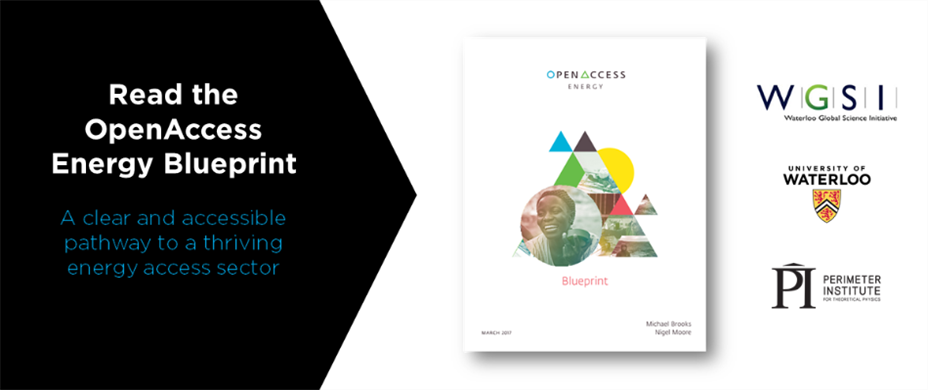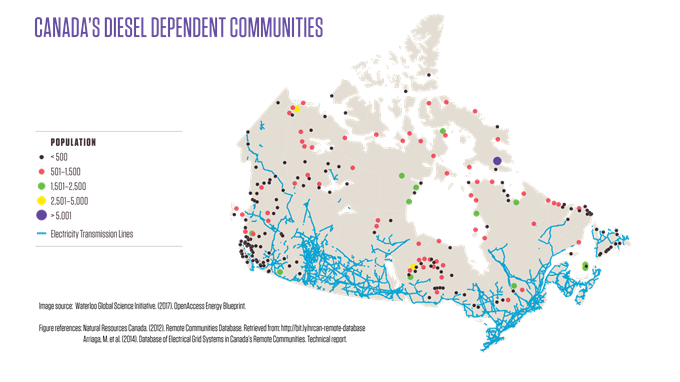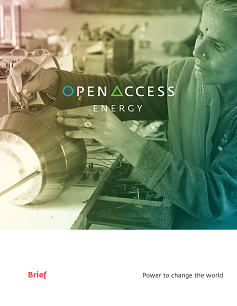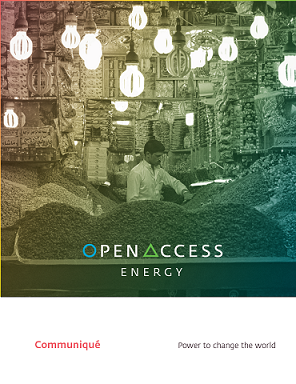
In partnership with: .png)
The Waterloo Global Science Initiative (WGSI) has developed the OpenAccess Energy Blueprint to achieving universal electricity access. This document is the result of multinational, multidisciplinary and mulitgenerational collaboration at WGSI's OpenAccess Energy Advisory Workshop (October 18-20, 2015), Summit (April 24-27, 2016) and further engagement with energy sector researchers, leaders and advisors.
The OpenAccess Energy Blueprint features:
- insight into proactive governance, creating a fair marketplace, empowering people, and effective entrepreneurship for energy access;
- a feature section on energy access challenges in Canada’s remote Indigenous communities;
- Solutions Spotlights featuring innovative technologies, business and finance models;
- a commitment to establishing and nurturing partnerships on the road to establishing energy access.



We are living in times of great economic and social opportunity. Emerging technological, social and business innovations mean that it is now possible for more than 1 billion people to, for the first time, gain access to the modern electricity services that will radically transform their well-being.
AA

Image credit: INTENT Source: WGSI's OpenAcesss Energy Blueprint
AA
Implementing this pathway will involve creating an ecosystem in which a dynamic energy access sector can thrive. This new sector of the global economy will need thousands of new actors and institutions working across borders, with massive flows of investment, materials and expertise. It will require innovation, and that in turn will require policy coherence across nations, standardization of technologies and practices, and local entrepreneurs and end-users involved in decision-making so that service configurations match local needs and ability to pay.

Image credit: INTENT Source: WGSI's OpenAcesss Energy Blueprint
AA
The pathway we recommend involves four clear steps, each of which requires the implementation of a number of strategies:
1. Enable – Establish national energy plans, and a policy and regulatory environment conducive to the creation of off-grid electricity services;
2. Align – Facilitate creative alliances between those seeking to provide electricity services and those who can finance the projects;
3. Empower – Build the human capacity to allow the sector to thrive – especially drawing on the strength of women and community members to deliver solutions at the ‘last mile’ through education, training and networking;
4. Incubate – Create financially sustainable platforms to help energy entrepreneurs succeed in creating sustainable energy businesses that can serve even the most difficult and impoverished markets.

Image credit: INTENT Source: WGSI's OpenAcesss Energy Blueprint
Read the Brief –
pre-summit report by WGSI
Read the Communique –
report of the last day of the summit
Energy access — the Canadian context, a special section in the OpenAccess Energy Blueprint, acknowledges the role of energy as the backbone of a better quality of life for Canada's remote and Indigenous communities and our responsibility to provide the supportive resources these communities need to not only meet their current minimum energy needs but to plan for plenty.

Four steps are required to establish this as an area of national priority:
1. Commit to a step change in investment Canada’s federal government should increase its overall funding commitments for energy in remote communities from the tens of millions to the billions in the immediate future. This funding should be seen as a priority area for ongoing green infrastructure spending programs.
2. Recognize Indigenous leadership and support capacity building In order to ensure long-term economic and social benefits, Indigenous clean energy leadership must be recognized and supported through capacity building programs.
3. Create a single, intergovernmental point of contact A single point of contact within government – whose responsibility is to ensure those initiating and managing energy projects can navigate regulations, funding and reporting at the federal and provincial/territorial level and across relevant departments – is essential.
4. Connect people, technologies and information Knowledge sharing between communities and innovative institutions is critical to success.Private and public sectors should be encouraged to utilize up-to-date information and innovative technologies to seek new arrangements for energy projects in remote communities that are financially sustainable over the long term.

